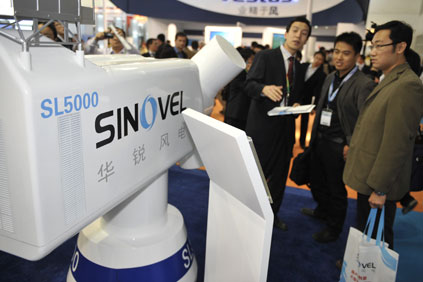Looking ahead to 2014, China also plans to boost the offshore wind sector by selecting a series of new pilot programmes.
But for some there was bad news. The country's stock market watchdog, the China Securities Regulatory Commission (CSRC), is to investigate Sinovel, once China's biggest turbine maker and world number three, over a suspected breach of security market regulations. This is the second such move by the CSRC in eight months.
Fall from grace
It is easy to forget that Sinovel was once the superstar of the Chinese wind industry. But the manufacturer has fallen a long way since its listing on the Shanghai Stock Exchange (SSE) in 2011 and has seen its domestic market share shrink from 23.2% in 2012 to just 5.6% in 2013. The company's current SSE market value has fallen to CNY 14 billion ($2.3 billion) from CNY 90 billion in 2011.
The roots of this are partly down to the failure of ambitious oversea expansion, which suffered a heavy blow after a multi-million dollar lawsuit — set to come to a head this year — with US technology company AMSC over potential intellectual-property thefts. Sinovel has closed down eight of its ten foreign branches since April 2013, leaving its oversea market in a more difficult situation.
It remains to be seen how Sinovel will keep pace with China's wind industry renaissance. Shi Pengfei, CWEA vice-president, is among those harbouring doubts over the company's future.
"It's hard to tell. Sinovel has some advantage in the offshore sector, maybe that is a chance," he said. "But the company still has unsolved problems, such as failure rate and maintenance cost. As other players regain their momentum, the market competition will bring more pressure on Sinovel."
Apart from industrial challenge, Sinovel's setback in the capital market could also hamper its attemps to improve its fortunes. After the CSRC's investigation, sales of the company's lock-up shares will be suspended. Sinovel was scheduled to float 1.84 billion shares on 13 January, worth about CNY 7.24 billion, as their lock-up period expired.
On 16 September last year, the CSRC issued an open condemnation to Han Junliang, Sinovel's founder and then board chairman, for the company's inflated sale data in 2011. According to CSRC regulation, Sinovel is forbidden to make either a public offering or private placement until September 2014.
Attempts to restructure
Sinovel had already made some changes long before Han's resignation as Sinovel board chairman in March 2013. As early as August 2012, Wei Wenyuan, a respected figure in China's stock market and co-founder of Sinovel, replaced Han as company president. Wei became board chairman after Han quit and restructured Sinovel into a smaller company with a more conservative strategy.
However, these were long-term solutions for immediate problems, and Wei resigned in May 2013. But the company's current top management recognises his efforts, which they said streamlined Sinovel's operational structure, controlled cost and diversified into markets such as wind-farm operation and turbine maintenance. Now, the plan appeared to be to wait and hope it will work.
"We will cut the cost by making some outsourced parts ourselves. We also have secured several wind farms before, now we can profit from their operation as a new sourse of income," said current Sinovel president Liu Zhengqi, who took over from Wei. He believes Sinovel can recover as the market rebounds after 2013.
Arguably the company has some catching up to do as other players pick up the pace. Sinovel's top rival Goldwind secured 22.4% market share in 2013, far more than the second place United Power's 9.2%. Goldwind's advantage in maintenance service will generate steady cashflow, as more and more wind turbines come out of warranty.
But Goldwind has always been a force. More worrying for Sinovel is the performance of smaller rivals that are closing the gap. Ming Yang and Envision, which both accounted for only about 5% in 2012, secured 7.9% and 7.8% of the market respectively in 2013, much more than Sinovel's 5.6%. Haizhuang “uåX˜äŠÊ˜·³Ç, once a marginal player outside top ten market share, achieved 4.9% in 2013.
While 2014 may just be a good year for China's wind industry, it could be make or break time for Sinovel.


.png)


HR.jpeg)
.png)








